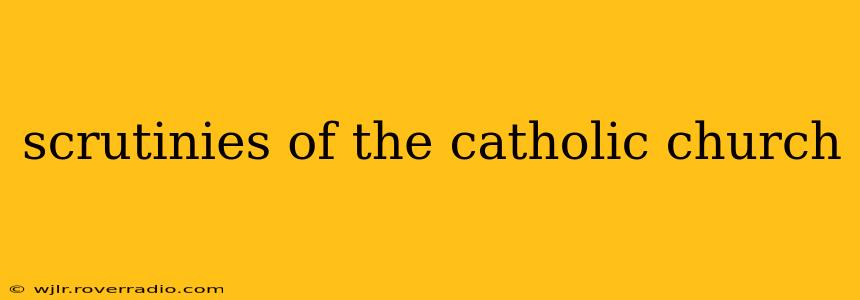The Catholic Church, as one of the world's oldest and largest religious institutions, has throughout its history been subject to various scrutinies. These examinations range from theological debates and internal reforms to external criticisms concerning its doctrines, practices, and historical actions. This exploration delves into the multifaceted nature of these scrutinies, examining both historical and contemporary perspectives.
What are the main criticisms of the Catholic Church?
Criticisms of the Catholic Church are diverse and span centuries. Some of the most prominent include:
-
Doctrinal issues: Challenges to papal infallibility, the nature of sacraments, and interpretations of scripture are ongoing debates, both within and outside the Church. These discussions often involve disagreements on the authority of tradition versus reason, and the role of individual conscience.
-
Historical controversies: The Church's historical involvement in events such as the Crusades, the Inquisition, and the colonization of the Americas has drawn considerable criticism for its perceived violence, intolerance, and abuse of power. The complexities of these historical periods require nuanced understanding, acknowledging both the actions of individuals and the broader socio-political context.
-
Moral and ethical concerns: Contemporary criticisms often focus on the Church's stances on issues such as abortion, contraception, homosexuality, and the role of women. These debates frequently involve conflicts between religious beliefs and evolving societal norms. The Church's response to these issues often faces scrutiny for its perceived rigidity and lack of inclusivity.
-
Abuse scandals: Perhaps the most impactful contemporary scrutiny revolves around the widespread sexual abuse of children and vulnerable adults by clergy. These scandals have shaken the Church's credibility and triggered calls for greater accountability and transparency. The Church's handling of these cases, including the cover-up of abuse, has drawn widespread condemnation.
What are some major historical events that have led to scrutiny of the Catholic Church?
Several historical events have significantly shaped the scrutiny faced by the Catholic Church:
-
The Reformation (16th century): Martin Luther's challenge to papal authority and the subsequent schism within Christianity profoundly impacted the Church's standing and led to widespread reform movements.
-
The Enlightenment (18th century): The emphasis on reason and individual liberty posed a direct challenge to the Church's authority and its traditional hierarchical structure.
-
The French Revolution (late 18th century): The revolutionary fervor led to significant persecution of the Catholic Church in France and other parts of Europe, forcing it to confront its relationship with political power.
-
The rise of secularism (19th and 20th centuries): The growing separation of church and state and the increasing influence of secular ideologies have resulted in ongoing debates over the Church's role in public life.
What reforms has the Catholic Church undertaken in response to scrutiny?
The Catholic Church has undertaken various reforms throughout its history in response to scrutiny. Significant examples include:
-
The Second Vatican Council (1962-1965): This council initiated significant changes, including a renewed focus on ecumenism (relations with other Christian churches), a greater emphasis on the laity's role, and a shift towards a more inclusive approach to liturgical practices.
-
Ongoing efforts to address clerical abuse: In recent decades, the Church has attempted to implement stricter policies and procedures to prevent and address sexual abuse within its ranks. This includes mandatory reporting requirements, improved background checks, and increased accountability for those responsible for handling abuse allegations.
How does the Catholic Church respond to criticism today?
The Catholic Church's response to criticism today is multifaceted and often complex. It ranges from outright rejection of certain criticisms to engagement in dialogue and attempts at reform. The Church continues to emphasize its core doctrines while acknowledging the need for adaptation and engagement with modern society. The ongoing efforts to address clerical abuse, for example, demonstrate a willingness to confront difficult issues, although much remains to be done to rebuild trust and fully address the legacy of abuse.
What is the future of scrutiny of the Catholic Church?
It's highly likely that the Catholic Church will continue to face scrutiny in the future. As societal values evolve and new challenges arise, the Church's doctrines and practices will inevitably be subject to ongoing debate and evaluation. The Church's response to these future scrutinies will be crucial in shaping its future trajectory and its ability to maintain its relevance and credibility in a rapidly changing world. Transparency, accountability, and a willingness to engage in open dialogue will be vital in navigating this complex landscape.
